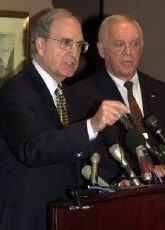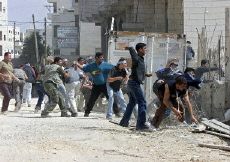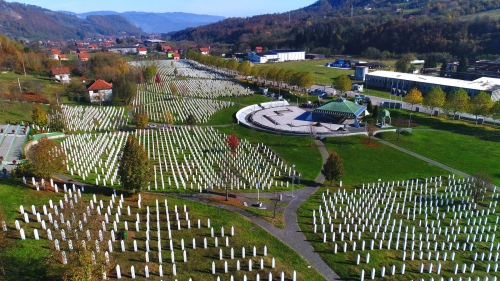Mitchell Report: Intifada's End the Impossible First Step
JERUSALEM, May 22 (AFP) - Despite the positive reception for the Mitchell report by both the Israelis and Palestinians, its implementation, requiring before anything else an immediate and unconditional halt to the violence, seems like a mission impossible.

Former US Senator George J. Mitchell (L) makes a point during press conference with former US Senator Warren B. Rudman (R) 21 May, 2001, in New York where they released the results of a report on violence between Israelis and Palestinians. Mitchell is the chairman of the Sharm El-Sheikh Fact-Finding Committee which calls for an end to the violence and a rebuilding of confidence between both sides. |
Both former US senator George Mitchell, head of the panel which drew up the report, and US Secretary of State Colin Powell called for an end to the violence before any of the commission's confidence-building recommendations can be implemented.
Another of the report's authors, European Union foreign policy chief Javier Solana, agreed, saying here Tuesday: "It is impossible to have confidence-building measures if they are fighting each other, so this stopping of violence is a precondition for measures to construct confidence among the parties."
Among those measures is a total freeze on Jewish settlements in the occupied territories, a chief demand of the Palestinians which the Israelis have refused, saying they need to allow for settlements' "natural growth."
In practice, then, the Mitchell report demands that the Palestinians, who launched an uprising against Israel in late September, take the first step by putting an end to the violence and calls on Israel to make a concession only in the following phase.
Israeli officials have not hidden their satisfaction.
The report is "closer to the Israeli position," said Efraim Inbar, director of the BESA Center for Strategic Studies at Bar-Ilan University.
For him, the conclusion of the report is simple, even if he has no illusions about its success: "They (the Palestinians) started the violence and they should put an end to it."

Palestinians protesters battle Israeli forces at the Ar-Ram checkpoint at the northern entrance of Jerusalem 15 May 2001. Israeli troops killed three Palestinians and wounded more than 120 others as clashes erupted throughout the West Bank and the Gaza Strip as Palestinians marked Al-Nakba or 'catastrophe,' the term Palestinians use for the creation of the state of Israel 53 years ago which made hundreds of thousands of Palestinians homeless. |
At the official level, both the Israelis and Palestinians accepted the report, and therefore the call for an end to the violence. But it is clear the two sides give very different readings to the document, especially on what is expected of them.
The Palestinian leadership said it welcomed the recommendations, "foremost its call for a freeze in settlement activities and a halt to violence against the Palestinians."
The Palestinians have long presented a total halt to settlements as a necessary countermeasure for a ceasefire.
The key question is therefore whether Palestinian leader Yasser Arafat will accept to risk his authority and his prestige to curb the numerous armed Palestinian movements -- starting with those linked to his own Fatah faction -- without any immediate concession in return by Israel.
According to Palestinian analyst Zakaria al-Qaq, Arafat remains the master of the overall uprising on the strategic level, but does not control the "tactical" aspects of the intifada.
"It's not like a switch. ... It does take a lot of time (to end the violence," said al-Qaq, co-chairman of the Israel/Palestine Center for Research and Information.
The Mitchell report also calls on Arafat to "immediately resume security operations" with the Israeli government.
That would clearly mean sending back to prison militants from Hamas and Islamic Jihad, Islamist movements responsible for most anti-Israeli bombing attacks, who were freed at the start of the intifada.
Considering how the intifada and Israeli crackdowns have radicalized Palestinian society, such a move would be difficult for Arafat -- or perhaps even politically suicidal.
US Ambassador to Israel Martin Indyk, one of three diplomats Powell charged with applying the Mitchell report, himself admitted Monday that Arafat faced a tough task.
"What you do is you get Arafat to act against the perpetrators of the violence, Hamas, the Tanzim gangs, the Islamic Jihad," Indyk said in a speech at Beersheba University.
"But that requires a great deal of energy and commitment on Arafat's part -- in very risky circumstances -- to take on the very angry Palestinian street."

















